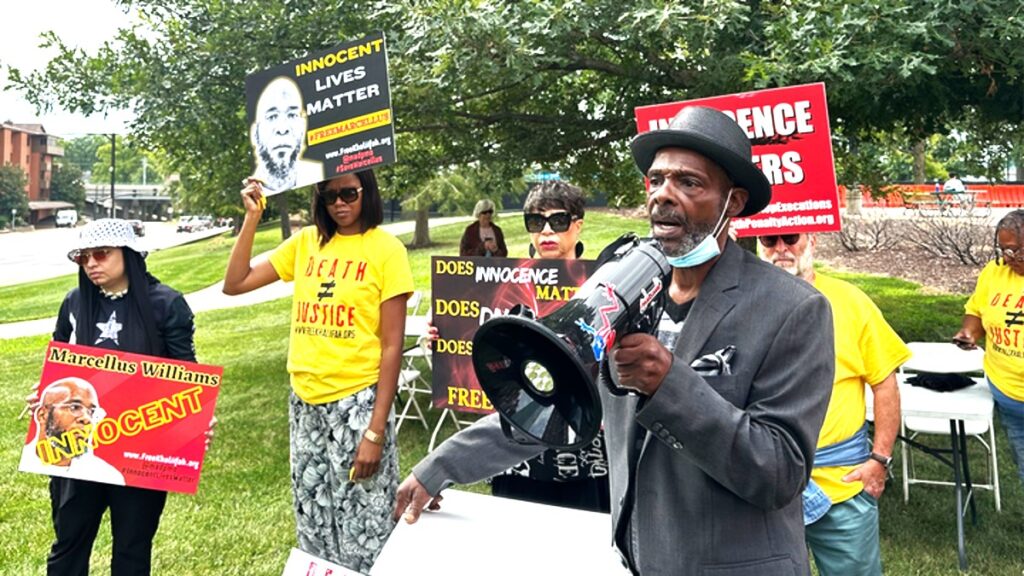A Missouri man, Marcellus Williams, was executed on Tuesday evening for the 1998 murder of Lisha Gayle, despite widespread calls from her family and the prosecuting attorney to spare his life. The execution has reignited discussions about the complexities and moral implications surrounding the death penalty, particularly in cases where questions about guilt and the judicial process persist.
The state of Missouri has executed Marcellus Williams DNA evidence exonerates him the Governor Still executed him , this is injusticehttps://t.co/CNDEF3BZaa pic.twitter.com/5ROADCz4mm
— First responder (@skinny_itallion) September 24, 2024Background of the Case
Marcellus Williams, 55, was convicted of breaking into Gayle’s home in suburban St. Louis and brutally stabbing her 43 times. At the time of the crime, Gayle was a social worker and former newspaper reporter. Prosecutors argued that Williams entered the home while Gayle was in the shower and used a butcher knife to commit the murder. They claimed he stole items from the home, including her purse and a laptop belonging to her husband.
Evidence presented at Williams’ trial included testimonies from his girlfriend, who stated she saw him with the stolen items shortly after the murder, and an inmate who claimed Williams confessed to the crime while they were incarcerated together. Despite this, Williams’ defense team highlighted significant flaws in the prosecution’s case, including issues related to jury selection and evidence handling.
Controversy Over Jury Selection and Evidence Handling
Williams’ attorneys raised concerns about the fairness of his trial, particularly pointing out that only one of the twelve jurors was Black. During the jury selection, six of seven Black prospective jurors were removed, leading to accusations of racial bias. The prosecutor at the time, Keith Larner, argued that he removed jurors based on their demeanor, but critics argue that this rationale raises questions about the integrity of the jury.
Additionally, new evidence emerged regarding the handling of the murder weapon, a knife that was mishandled by law enforcement, raising doubts about DNA evidence that could have pointed to Williams’ innocence. Recent DNA testing indicated that the knife had been contaminated by individuals in the prosecutor’s office, further complicating the narrative of Williams’ guilt.
Family’s Pleas for Clemency
In the lead-up to the execution, Lisha Gayle’s family publicly expressed their desire for Williams’ sentence to be commuted to life in prison without parole. They argued that his execution would not provide them with closure and that they defined closure as allowing him to live. This sentiment was echoed by St. Louis County Prosecuting Attorney Wesley Bell, who sought to have Williams’ death sentence vacated due to emerging doubts about his guilt.
Despite these pleas, Governor Mike Parson and the Missouri Supreme Court refused to intervene, stating that the judicial process had run its course and that Williams had exhausted all legal avenues. Parson maintained that no evidence had convincingly established Williams’ innocence throughout the lengthy legal proceedings.
Execution and Aftermath
Williams’ execution took place shortly after the U.S. Supreme Court declined to grant a stay, despite last-minute appeals from his legal team. In his final moments, Williams was reported to have conversed with a spiritual advisor, reflecting on his beliefs before being administered lethal injection. He reportedly said, “All Praise Be to Allah In Every Situation!!!” just before his death.
The execution, which marks the third for Missouri this year and the 100th since the state resumed capital punishment in 1989, has drawn widespread criticism. Advocates for death penalty reform, including the NAACP, condemned the execution, claiming it exemplifies systemic failures in the justice system. NAACP President Derrick Johnson stated, “Missouri lynched another innocent Black man,” emphasizing the racial and procedural injustices that pervade capital punishment cases.

Broader Implications of the Case
The case of Marcellus Williams highlights the ongoing debate about the death penalty in the United States. It raises critical questions about the risk of executing potentially innocent individuals, particularly given the documented history of wrongful convictions in capital cases. Since 1973, at least 200 individuals sentenced to death have been exonerated, underscoring the need for greater scrutiny of the judicial process.
As states like Missouri and Texas ramp up executions, advocates for criminal justice reform continue to call for a reevaluation of capital punishment practices. The complexities surrounding cases like Williams’ demonstrate the urgent need for comprehensive legal reforms to ensure that the rights of all individuals are protected within the judicial system.
Marcellus Williams’ execution serves as a stark reminder of the contentious nature of the death penalty in America. With significant questions surrounding his conviction, the calls for clemency from the victim’s family, and the scrutiny of the legal process, this case will likely remain a focal point in discussions about justice, race, and the ethics of capital punishment. As the nation grapples with these issues, the hope for a more equitable justice system remains a critical pursuit for many advocates and organizations dedicated to reform.
Read More : Trump Mocks Kamala Harris Over McDonald’s Job Claim: A Dive into Their Political Rivalry






